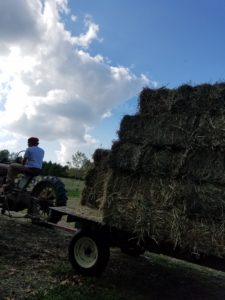Main Body
Summer
It’s the smell of baked earth, hard and cracked beneath your dusty boots, and free-flowing sweat, even in the shade. The rhythmic hum of buzzing flies and swishing tails would be poetic if the winged parasites weren’t seizing every opportunity to torment your livestock—and you, when given the chance. You relieve the animals’ suffering as best you can with various chemical sprays and powders, but the animals often turn to the more traditional remedies of meandering through the pond or standing head to tail with a pasture mate to form an effective, pragmatic partnership. When you are young you roll up your sleeves so the sun’s bronzing power can touch as much of your skin as is modestly possible, paying little heed to warnings of its short-term and long-term effects. When you are older and too practical for such vanity, you wear long sleeves on the brightest days to protect as much of your skin as possible, urged by the memory of your great-uncle having the tips of his ears removed to stop the spread of skin cancer. Even though the sunshine is plentiful, you cannot waste it; your days are long, and at the end of each day your shirt, no matter the style or fabric, will have a swirling pattern of salt from your perspiration. At night the tree frogs and crickets are all competing to be heard across the stifling stillness, and you wonder how your grandparents could sleep on such nights before ceiling fans and air conditioning.
You cannot let the daily heat lull you into complacency; cooler seasons are approaching, and you must prepare for them while you can. As the days begin to shorten ever-so-slightly (but the heat remains an almost constant certainty), you continue the process that’s been done so many times before. The hay must be cut and cured, but rather than scythes and other hand implements, you cajole the aging, patched up haybine into service for another season. Its rotating bars on the front of the bine push the tall grasses, clover, and alfalfa flat to be shorn with rhythmic efficiency by the cutter bar in the belly of the machine, its rows of mechanical teeth like tiny scythes laying the grasses flat where they once stood for the sun to complete the curing process. In a day or two (or even in a few hours, if the day is especially hot and dry), you’ll return and rake the dried foliage into tidy windrows. The heat and humidity will determine how much longer the hay must cure before being gathered and stored; whether by pitchfork into haystacks or by tractor-powered balers into compact bundles and rolls, the harvest must follow proper process and schedule. To bale the hay before it has cured will result in insidious mold destroying the bales from the inside out—or, worse, destroying your barns and your harvest. The microscopic organisms lingering on damp, under-cured hay harbor the power to cause chain, chemical reactions. Insulated from the outside air by layers of hay, the bacteria fester to the point of spontaneous combustion if left unchecked, reminding you again that your alleged power over natural processes is not limitless. You may be able to preserve spring and summer grasses as fodder for your livestock in the cold months, but you cannot conquer a lowly bacteria if you fail to fully recognize its power.

You spend more time behind the wheel of your tractor than the wheel of your car, stopping only for meals, sleep, and to hook and unhook from needed equipment. The mechanization of agriculture made the farmer’s work more efficient, certainly, but not any less demanding. You work when there is light to do so (and sometimes when there is not), and your place at the dinner table is almost always designated by a manual for some piece of equipment; to make repairs yourself is far more sensible than hiring a mechanic. Whether by hand or machine, you painstakingly harvest and store, harvest and store, harvest and store. Within the span of a few weeks you’ve gone from praying for a small breeze to stir the sticky air so you can breathe to tugging your jacket lapels up around your ears in the evenings. Soon the sleek hides of the broodmares and cows are obscured by winter coats, and they’re grateful to be separated from their half-grown colts and calves.
